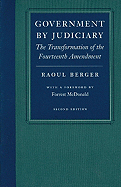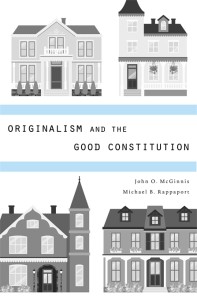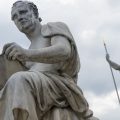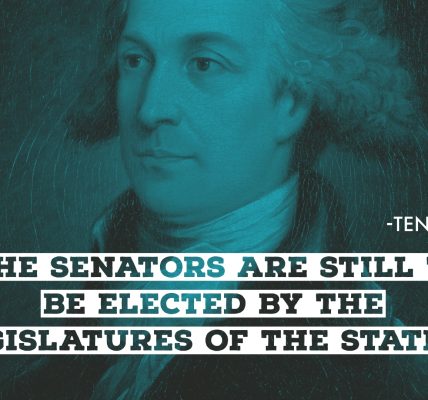by Raoul Berger
EDITOR’S NOTE: The following is an excerpt of the book (chapter 16) Government by Judiciary: The Transformation of the Fourteenth Amendment, Foreword by Forrest McDonald (2nd ed.) (Indianapolis: Liberty Fund, 1997).
It is a singular fact that the most significant single piece of evidence that the Framers excluded the judiciary from policymaking—rejection of their participation in a Council of Revision of legislation—went unnoticed by bench and bar until it was called to their attention by a political scientist, Benjamin F. Wright.
Not the least remarkable aspect of judicial neglect of this history is that it should finally be invoked by Justices Black (1965) and Douglas (1968), oblivious to the shattering effect that it has on their own sweeping policymaking decisions.
Edmund Randolph proposed in the Convention that the President, “and a convenient number of the National Judiciary, ought to compose a council of revision” to examine every act of Congress and by its dissent to constitute a veto. When his fellow Virginian George Mason argued for judicial participation in the presidential veto, he recognized that judges already could declare an unconstitutional law void. But with regard to every law however unjust oppressive or pernicious, which did not come plainly under this description, they would be under the necessity as Judges to give it a free course. He wished further use to be made of the Judges, of giving aid in preventing every improper law.
A similar differentiation was drawn by James Wilson:
Laws may be unjust, may be unwise, may be dangerous, may be destructive; and yet be not so unconstitutional as to justify the Judges in refusing to give them effect. Let them have a share in the Revisionary power [in order to “counteract” ] the improper views of the Legislature.
Despite the fact that the proposal had the support of Madison, and, therefore, of perhaps the most influential trio in the Convention, it was rejected for reasons that unmistakably spell out the exclusion of the judiciary from even a share in policymaking. Nathaniel Gorham saw no “advantage of employing the Judges in this way. As Judges they are not to be presumed to possess any peculiar knowledge of the mere policy of public measures.” Elbridge Gerry, one of the most vigorous advocates of judicial review, opposed judicial participation in the Council:
It was quite foreign from the nature of ye office to make them judges of the policy of public measures . . . It was making Statesmen of the Judges; and setting them up as the guardians of the Rights of the people. He relied for his part on the Representatives of the people as the guardians of their Rights and Interests. It was making the Expositors of the Laws, the Legislators which ought never to be done.
Charles Pinckney also “opposed the interference of the Judges in the Legislative business.” Rufus King joined in the opposition on the ground that as “the judges must interpret the Laws they ought not to be legislators.” Roger Sherman “disapproved of Judges meddling in politics and parties.” It is reasonable to infer that John Dickinson expressed a widely shared view in cautioning that “The Justiciary of Aragon . . . became by degrees the law-givers.” Plainly the Framers refused to make the judiciary “law-givers,” even to the extent of allowing them to share in the legislative making of law, let alone finally to decide on policy, an exclusive legislative function.
They drew a line between the judicial reviewing function, that is, policing grants of power to insure that there were no encroachments beyond the grants, and legislative policymaking within those bounds. “Dangerous” and “destructive” as such policies might be, they were yet to be the exclusive province of the legislature. That is the inescapable inference from the facts, and, as will appear, it is fortified by still other historical facts.
Justice Douglas therefore stood on solid ground in stating that “when the Court used substantive due process to determine the wisdom or reasonableness of legislation, it was indeed transforming itself into the Council of Revision which was rejected by the Constitutional Convention.” In a remarkable example of compartmentalized thinking he went on to say, “we no longer exercise that kind of power,” just as he had earlier stated in Griswold v. Connecticut that the Court no longer acts as a “super legislature” —except in a case touching the “right of privacy.”
The history of the Council of Revision also serves to refute the view that judicial review is an expression of “distrust in popular government,” or, in Corwin’s oft-quoted phrase, having bet on democracy, the Framers then “covered their bet.” The “cover,” however, went no further than to prevent the legislature from “overleaping its bounds.” In fact the judiciary was excluded from halting “dangerous . . . destructive” legislation that was within those bounds. If the Framers “covered their bet,” they gave the last trump to Congress: judges who usurped power, for example, exercised a power withheld, said Hamilton, could be impeached.
The Founders unequivocally rejected the judiciary as “guardians of the people”; they preferred, in Gerry’s words, to put their trust in “the Representatives of the people.” For judicial review was an innovation by no means universally admired; it was a departure from Blackstone’s “omnipotent parliament.” Having “smarted” under the “omnipotent power of the British parliament,” said James Iredell, we should “have been guilty of . . . the grossest folly” had we “established a despotic power among ourselves.” If this could be said of a legislature that could be turned out of office periodically, constitution-makers were even less ready to entrust unlimited power to an untried, unelected judiciary appointed for life.
The judicial role, it cannot be unduly emphasized, was limited to policing constitutional boundaries. James Wilson said it is necessary that Congress be “kept within prescribed bounds, by the interposition of the judicial department.” The courts, said Oliver Ellsworth, were a “check” if Congress should “overleap their limits,” “make a law which the Constitution does not authorize.” Judges, John Marshall stated in the Virginia Convention, could declare void “a law not warranted by any of the powers enumerated.” Hamilton stressed that the courts were to serve as “bulwarks of a limited Constitution against legislative encroachments.” But “within those limits,” Madison said, there were “discretionary powers.”
 The exercise of that discretion, as we have seen, is for the branch to whom it has been confided. No one, so far as my search of the several convention records uncovered, looked to the Court for “leadership” in resolving problems that Congress, the President, or the States failed to solve. That view is a product of post-Warren euphoria. The courts were expected to “negative” or set aside unauthorized action, to “check” legislative excesses, to “restrain” Congress within its prescribed “limits,” to prevent the “usurpation” of power. The Court, in other words, was to act as nay-sayer, not as initiator of policy. Justice Stephen Field, supreme activist of his time, stated upon his retirement in 1897 that “This negative power, the power of resistance, is the only safety of a popular government.”
The exercise of that discretion, as we have seen, is for the branch to whom it has been confided. No one, so far as my search of the several convention records uncovered, looked to the Court for “leadership” in resolving problems that Congress, the President, or the States failed to solve. That view is a product of post-Warren euphoria. The courts were expected to “negative” or set aside unauthorized action, to “check” legislative excesses, to “restrain” Congress within its prescribed “limits,” to prevent the “usurpation” of power. The Court, in other words, was to act as nay-sayer, not as initiator of policy. Justice Stephen Field, supreme activist of his time, stated upon his retirement in 1897 that “This negative power, the power of resistance, is the only safety of a popular government.”
When, therefore, James Bradley Thayer and Learned Hand insisted that the role of the Court was to police the boundaries of constitutional grants, not to interfere with the exercise of legislative or executive discretion within those boundaries, they rested firmly on the authority of Hamilton and the preponderant view of the Founders. For 150 years the Court was content with this policing function; even the headstrong laissez-faire Court merely acted as a nay-sayer. It fell to the Warren Court toinitiate policy when the legislative and executive failed to act, to take the lead in deciding what national policy ought to be. But the failure of Congress to exercise legislative power does not vest it in the Court.
SOURCE: Tenth Amendment Center – Read entire story here.






